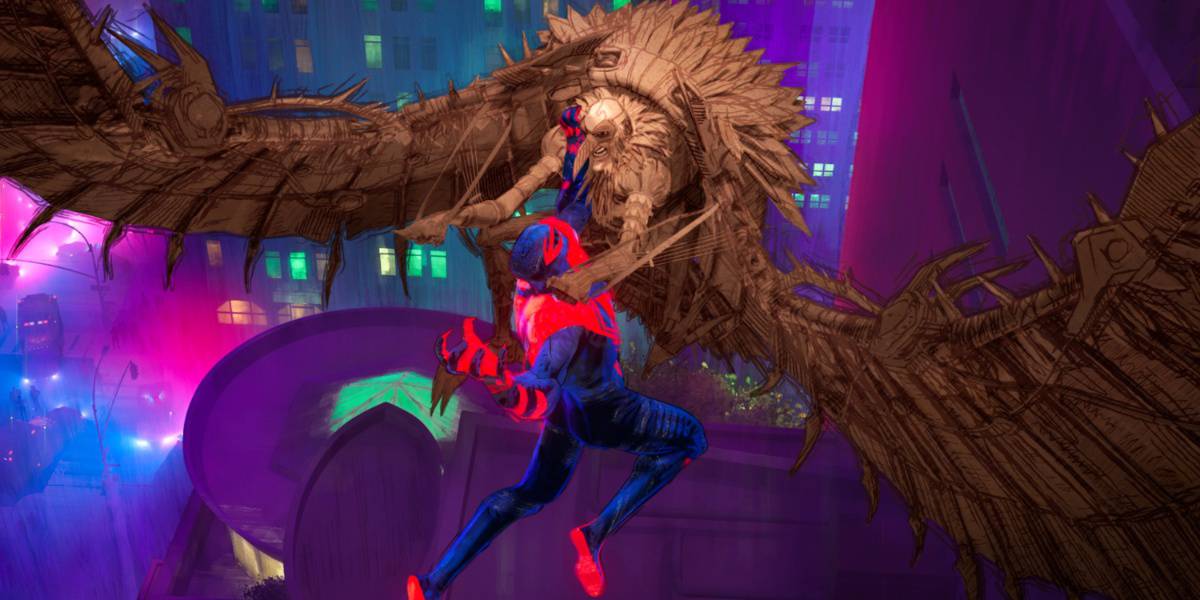The creative minds behind Marvel Studios/Sony Pictures’ Spider-Man: Across the Spider-Verse (2023) had some strong words for the movie’s secondary antagonist: Miguel O’Hara (AKA Spider-Man 2099), played by Oscar Isaac.

It’s been a little over a week since the highly-anticipated sequel to 2018’s Spider-Man: Into the Spider-Verse swung into theaters, and it’s already shattering box office records. With an impressive opening weekend debut of $120 million, Across the Spider-Verse now stands as Sony’s highest-grossing animated release in history.

Picking up a year after the events of the first film, the comic book sequel follows Miles Morales (Shameik Moore), Brooklyn’s friendly neighborhood Spider-Man, as he finds himself suddenly reunited with Earth-65’s Gwen Stacy (Hailee Steinfeld). After being lured into the mysterious Spider-Society, led by its equally mysterious leader, Miguel, Miles finds himself the target of a multiversal team of Spiders—who all claim that Miles isn’t the Spider-Man he thinks he is.
Check out the official trailer for Marvel Studios and Sony Pictures’ Spider-Man: Across the Spider-Verse (2023) below:
Unarguably, one of the high points of the new film is Isaac’s historic Marvel performance, which is both menacing and easy to emphasize with as a viewer. Despite initially rooting for him, Miguel becomes an antagonistic figure for Miles and Gwen throughout the film, dropping his “good guy” status by the second act. With Miguel so dedicated to maintaining the presence of canon events across the Multiverse, he and the Spider-Society will go to any lengths to preserve “order” among their web of Spider-People, no matter the price.

And surprisingly, despite being a fan-favorite character, the film’s producers, Phil Lord and Chris Miller, revealed that Spider-Man 2099 actually underwent the most changes out of any Spider-People during production.
Speaking with Rolling Stone about the adjustments made to Isaac’s character, Miller admitted that Miguel, for a time, “was too big of an a***hole” in early scripts. This realization led to more insight into the character’s tragic backstory, developing him further into a “three-dimensional character:”
There’s 1,000 smart people working on this movie for a long time and continually adjusting and shifting. And for a while he was too big of an asshole. [Laughs] And we were trying to be elegant about implying his backstory and his reasoning. Then we figured out that we had to let the audience in on his story the way we did on Gwen’s and on everybody else’s. That allowed him to be a more three-dimensional character.

While his early iterations aren’t too far off from his demeanor in Across the Spider-Verse, it was surely a good move on Lord and Miller’s part to make Miguel’s actions more sympathetic to viewers. To do this, Lord looked at Isaac’s character as a hardliner, which is a person in life that’s usually “most traumatized” in their own past. With Isaac himself even coming from “an exile community of Cubans,” Lord thought to bring that same feeling to Spider-Man 2099:
One of the things we talked about with Oscar was like, we know people in our lives that are hardliners, right? And what makes them a hardliner is, they’re mostly traumatized. And the only way out is through a kind of orthodoxy. Because you can’t tolerate dissent, because dissent is to question whether your pain is legitimate or not. Oscar is from an exile community of Cubans, and that’s a lot of how people feel. And we were like, well, let’s expose the beginnings of that trauma, and so you’re sort of rooting for Miguel to find some other way. Because this was not working for him.
Although he’s poised to continue his villainous arc in the upcoming threequel, Spider-Man: Beyond the Spider-Verse (2024), perhaps this is a sign Miguel will redeem himself to help Miles, Gwen, and other Spiders fight the Multiverse’s actual big bad—The Spot (Jason Schwartzman).

With a central theme of the Spider-Verse franchise being that people can change for the better, it wouldn’t be surprising to see Miguel atone for his past actions after some grand revelation involving Miles. If so, he could finally take the time to process his dark past and maybe even shed some of his disagreeable qualities along the way.
Undoubtedly, it was a smart move on the producers’ behalf not to make Miguel such a two-dimensional villain, and it’ll be interesting to see how his character evolves in the upcoming threequel.
What did you think of Miguel O’Hara’s characterization in Across the Spider-Verse? Do you agree with the producers’ choice to make him a more sympathetic villain, or did you want to see more of his dark side? Share your thoughts in the comments below.
